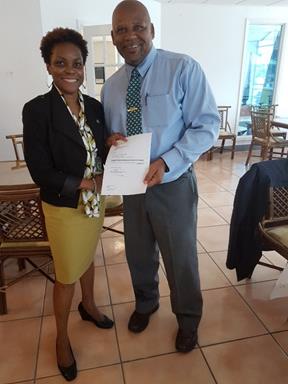|
FAO news release
November 20, 2017 at 10:30 AM

Dr Lystra Fletcher-Paul, FAO Subregional Coordinator Ezechiel Joseph and Saint Lucia’s Minister of Agriculture. (Photo: FAO).
|
Bridgetown, Barbados (TDN)
– In keeping with their commitment to agricultural safety, food security, the environment and human health, 11 Caribbean countries are now free of large stocks of hazardous pesticide waste and their contaminated containers and warehouses. Last month, the Food and Agriculture Organization of the United Nations (FAO) confirmed the removal of 319 tonnes of obsolete pesticide stocks and associated wastes at the 71st Special Session of the Council for Trade and Economic Development on Agriculture, held at the CARICOM Secretariat in Georgetown, Guyana. During the meeting, the Ministers of Agriculture of Antigua and Barbuda, Barbados, Dominica, Guyana, Jamaica, St. Kitts and Nevis, St. Lucia, St. Vincent and the Grenadines, Suriname and Trinidad and Tobago received certificates of disposal indicating that hazardous obsolete pesticide stocks removed from these countries had been environmentally incinerated at a dedicated facility in the United Kingdom. The certificates were issued by Dr. Lystra Fletcher-Paul, FAO’s Sub-Regional Coordinator. Obsolete pesticide stocks in the Dominican Republic were also recently secured and exported to the same facility for destruction, for which a certificate of disposal was issued. Caribbean countries have traditionally been vulnerable to the intrusion of potentially harmful, unregistered and unregulated pesticides, including counterfeit, substandard and banned products, which pose risks to food security and food safety in the region, due to their small size, limited human and financial resources and inadequate regulatory systems to adequately manage the import and use of pesticides. “The removal of these very dangerous toxic chemical wastes from 11 Caribbean countries removes a significant risk in these fragile environments,” said Mark Davis, FAO Chief of Safeguards and Coordinator of the Caribbean Obsolete Pesticides Project Development. “This was done without any harm to people or the environment, a testament to the determination and high quality of work by all involved.” By removing these chemical stockpiles as well as contaminated sites and containers, this achievement reduces people’s exposure to highly hazardous and obsolete pesticides, providing significant benefits to community and environmental health. “Obsolete pesticides are no longer usable for any purpose and are considered hazardous toxic waste. Stockpiles are often stored improperly and toxic chemicals can leak into the environment, threatening human and environmental health. Pesticide containers are also dangerous as they contain residues and are often used to store food or water,” said Guy Mathurin, Regional Project Coordinator at FAO’s Subregional Office for the Caribbean in Barbados. The successful disposal of hazardous pesticides was made possible by the hard work and collaboration of project country governments and the Coordinating Group for Pesticide Management in the Caribbean (CGPC), with technical support from FAO Headquarters in Italy (Pesticide Risk Reduction Unit) and funding from the Global Environment Facility (GEF) under the project titled “Disposal of Obsolete Pesticides, including Persistent Organic Pollutants, Promotion of Alternatives and Strengthening Pesticide Management in the Caribbean”. “The biggest challenge for countries is to prevent the accumulation of obsolete pesticides by addressing the problem at the source by strengthening national legislative capacity, conducting risk assessments, properly managing stocks, using non-chemical pesticides, applying Integrated Pest Management (IPM) and agroecological practices,” said Gu Baogen, FAO senior official and leader of the Pesticide Risk Reduction Team. “It is clear that countries in the Caribbean are committed and continue to make great efforts to strengthen the life cycle management of chemicals.” The project will promote the use of less-toxic and non-toxic alternatives for crop pest control, improve food quality through better control of pesticides, and ultimately reduce pesticide residues in food and the environment. “The destruction and final disposal of 319 metric tons of obsolete pesticides in 11 Caribbean regions, with technical support from FAO and funding from the Global Environment Facility, is a remarkable success story,” said Miriam Serrut, Pesticide Registrar at the Belize Pesticide Control Commission and current Chairperson of the CGPC. “Starting from scratch, these countries can initiate and implement pesticide stockpile management systems to prevent the accumulation of obsolete pesticide stocks in the future. To achieve this, all stakeholders, especially the pesticide industry, must adhere to their responsibilities as set out in the FAO/World Health Organization (WHO) International Code of Conduct on Pesticide Management.” “The CGPC would like to express its sincerest gratitude to the national counterparts involved in the disposal project, FAO, lead project consultant Guy Mathurin, the Global Environment Facility and the disposal company Veolia Environment for their outstanding work. Congratulations!”
![SocialTwist Tell a friend]()
|